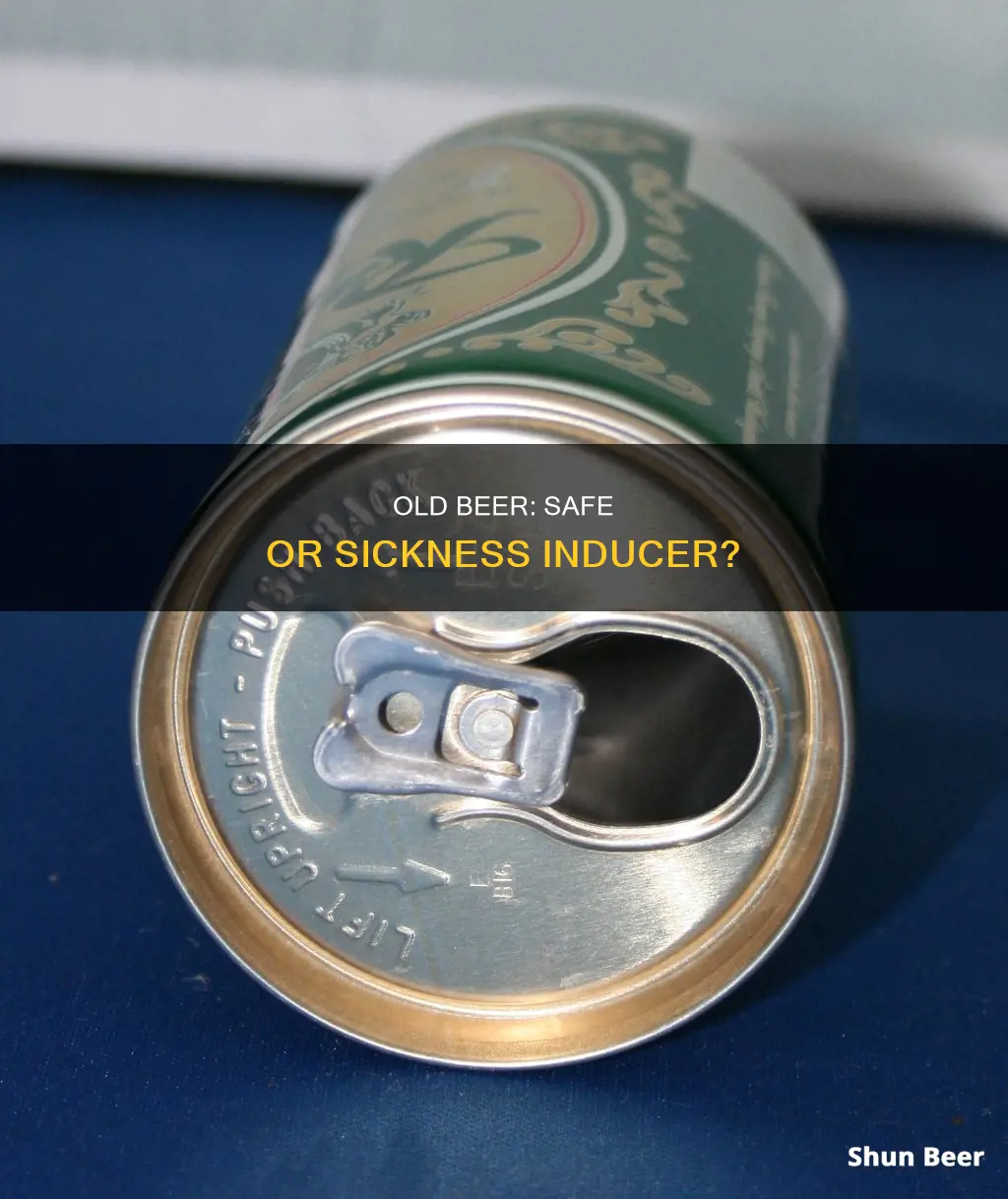
Drinking old beer is a common occurrence, and many people wonder if it can make them sick. The short answer is no—drinking beer past its expiration date will not make you sick. Beer is resistant to spoiling as the fermentation process, low pH level, and alcohol content make it difficult for bacteria to grow. However, the taste of the beer will degrade over time due to exposure to light, oxygen, and heat, which affect its organic compounds. While drinking old beer is safe, it is important to note that a change in taste may be unpleasant, and a loss of fizz or vinegary taste can indicate that the beer should be discarded.
What You'll Learn

Beer doesn't expire, but its flavour will degrade over time
Beer is a perishable product, and its flavour will degrade over time. However, it does not expire in the same way that fresh milk does. Old beer will not make you sick, but it will taste bad. Beer is extremely resistant to spoiling because the fermentation process used in brewing, as well as its low pH level and alcohol content, make it an unfriendly environment for microorganisms.
The four main culprits of spoiled or "skunked" beer are light, oxygen, heat, and time. Beer is sensitive to UV radiation from the sun, and exposure to sunlight for under an hour can cause a chemical reaction that produces 3-methyl crotyl mercaptan, a compound that gives off a distinct skunky flavour. Most beer bottles are tinted brown to mitigate this, and the use of aluminium cans also helps to block out UV rays.
Oxygen interacts with the compounds from malt, yeast, and hops, causing oxidation and a disappointing papery taste. Heat speeds up oxidation, so storing beer in a refrigerator is recommended. Major changes in temperature can also negatively impact the flavour of beer.
The speed of these reactions depends on the alcohol content of the beer and how it's stored. Beers with higher alcohol by volume have a longer shelf life. Refrigerating beer slows the process of aging, so it's best to buy beer that is already cold and store it in the fridge.
While beer doesn't expire in the traditional sense, its flavour can change dramatically over time. Fresh lager has bright hops flavour and refreshing bitterness, while a year-old bottle may taste distinctly malty, sweet, and flat.
Does Abstaining From Beer Affect Yeast Infections?
You may want to see also

Factors that negatively impact beer are light, oxygen, heat and time
Beer is affected by a few factors that can cause it to spoil or "skunk." These include light, oxygen, heat, and time.
Light
Beer is sensitive to light, particularly ultraviolet (UV) light. When beer is exposed to UV light, it undergoes a chemical reaction that produces 3-methyl crotyl mercaptan, a compound that gives beer a distinct skunky flavour and aroma. This is why most beer bottles are tinted brown and why beer is often packaged in aluminium cans.
Oxygen
Oxidation is generally considered harmful to beer. Oxygen interacts with the compounds from malt, yeast, and hops, causing oxidation and a disappointing papery taste. Although modern packaging techniques are used to minimise oxygen exposure, a small amount of oxygen still makes its way into beer containers, and flavour changes are inevitable. Once a beer container is opened, oxidation accelerates, and if left out for too long, the beer will be spoiled.
Heat
Heat speeds up the oxidation process, so storing beer at room temperature is not recommended. Major temperature changes, such as moving beer from a cooler to a hot car, can also negatively impact the beer's flavour.
Time
Beer does not expire like milk, but its flavour can change over time. Hoppy beers, for example, tend to lose their flavour after three to six months due to the fragility of their fresh ingredients. On the other hand, bottle-conditioned beers with a higher alcohol content can improve with age, as new reactions and nuances develop, enhancing the flavour profile for many drinkers.
Easton Beach, RI: Beer Drinking Allowed?
You may want to see also

Beer is pasteurised or filtered to eliminate bacteria
Beer is a drink that has been enjoyed for centuries, and while it doesn't expire in the same way that milk does, it can certainly go bad. However, even if you find a can of beer that is decades old, it is unlikely to make you sick. The fermentation process, low pH level, and alcohol content in beer create an environment that is unconducive to the growth of harmful microorganisms.
That being said, there are a few exceptions to this rule. If the beer has lost its carbonation, it indicates that the seal has been compromised, and the beverage may be unsafe to consume. Additionally, if a beer develops a vinegary taste, it is a sign that bacteria have contaminated it, and it should be discarded.
To prevent spoilage and ensure the safety of their product, some brewers employ a process called pasteurization. Pasteurization involves heating the beer to a temperature that kills any living microbes, without altering its chemistry or flavour. This technique was pioneered by Louis Pasteur in the 1870s to address the issue of beer spoilage and has been widely adopted by the brewing industry.
However, in recent times, there has been some resistance to pasteurization, particularly in the craft beer community. Critics argue that the rapid heating and chilling process can negatively impact the flavour and aroma of the beer, making it less appealing to consumers. As an alternative, some brewers employ a process called sterile filtration, or "cold sterilization," which effectively removes spoilage organisms without the use of heat treatment. This method is claimed to preserve the flavour of the beer while still ensuring its safety.
Ultimately, the decision to pasteurize or filter beer depends on the brewer's preference and the specific characteristics of the beer being produced. While pasteurization has its benefits in terms of shelf life and standardization of taste, it may not be necessary for all beers, especially those that are produced and consumed quickly.
Centrifugal Force: Spinning Beer to Perfection
You may want to see also

Beer should be stored in a cool, dark place
Oxidation is also generally seen as negatively affecting beer. Although canning and bottling techniques have improved, there is still a small amount of oxygen in each vessel of beer. For most light styles, like pilsners, oxidation sets in rather quickly, and those bright, malty flavours can quickly turn into acidic flavours of stewed tomatoes with a cardboard-like aftertaste.
High heat can make beer go stale, so storing your brews in a hot garage during the summer will negatively affect your beer's flavour. However, a bit of time at room temperature won't hurt. Many stores stock their beers without refrigeration, and as long as you re-refrigerate room-temperature brews, they should be fine.
If you don't have fridge space, store your beer in a dark place, such as a basement, under a bed, or a closet. Warm temperatures are not the only threat to your beer. Fluorescent light can also cause your beer to "skunk".
Beer Tube Screens: How Do They Work?
You may want to see also

Beer tastes best when consumed within three to six months of packaging
Beer is a perishable product that can go "bad" or "off" over time. However, this does not mean it will make you sick. The fermentation process used in brewing, as well as its low pH level and alcohol content, make beer an unfriendly environment for bacteria and other microorganisms. Therefore, even if a beer sits on the shelf for years, as long as it's sealed, it's unlikely to make you ill.
However, the taste of beer will change over time, and what was once a refreshing treat could become a real stinker. The four main culprits of spoiled or "skunked" beer are light, oxygen, heat, and time. Hops are sensitive to UV radiation from the sun, and beer exposed to sunlight, even for under an hour, will undergo a chemical reaction that produces 3-methyl crotyl mercaptan, a compound that gives off a distinct skunky flavour.
Oxidation also negatively affects beer. Oxygen interacts with the compounds from malt, yeast, and hops, causing oxidation and a disappointing papery taste. Heat speeds up oxidation, so storing beer in a refrigerator is a must. Major changes in temperature can also affect the beer's flavour and, sadly, this can't be reversed.
Beer consumed after its "best by" date will usually taste flatter and sweeter. To enjoy beer at its best, buy it cold, store it in the fridge, and consume it within three to six months of packaging, or before its best-by date. While beer doesn't expire per se, its flavour tends to deteriorate after the three- to six-month mark due to the fragility of its fresh ingredients and the factors mentioned above.
Only you can prevent bad beer! Keep your beer in a cool, dark place, preferably the refrigerator. If you're storing it at room temperature, ensure the sun can't reach it. Leave your beers standing upright to allow for less exposure to oxygen than if the bottle or can were lying on its side. Most importantly, enjoy it fresh and as close to its "born on" date as possible.
Beer and Vinegar: A Safe Mix?
You may want to see also
Frequently asked questions
No, drinking old beer will not make you sick. Beer is a perishable product that stales when exposed to light, oxygen, and heat, but it is extremely resistant to spoiling. The fermentation process, low pH level, and alcohol content make it difficult for bacteria to grow.
The flavour of expired beer degrades over time. It can taste flat and sweet, with a cardboard-like aftertaste.
Beer is best consumed within three to six months of packaging, or before its best-by date. However, it can be safely consumed past this date.
If the beer has lost its fizz or has developed a vinegary taste, it has likely gone bad and should be discarded.
To keep beer fresh, store it in a cool, dark place, preferably a refrigerator. If stored at room temperature, ensure it is not exposed to sunlight. Keep the beer standing upright to minimise exposure to oxygen.







